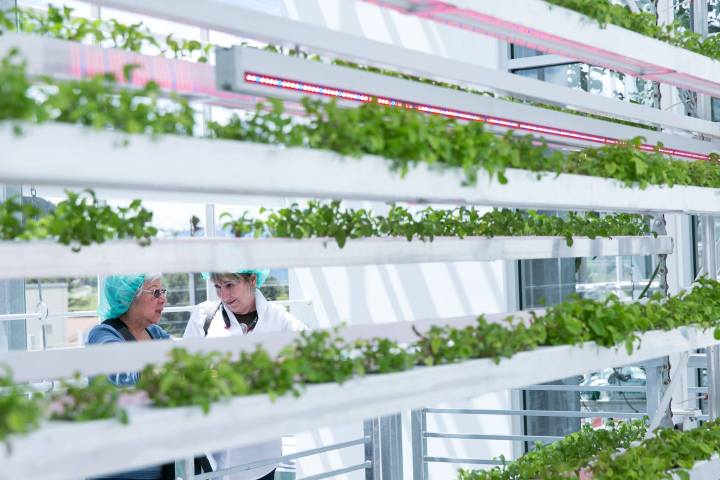
Housed in a 13,500 square foot three-story complex In Jackson Hole, Vertical Harvest is a series of vertical greenhouses that sits upon a “sliver of vacant land next to a parking garage.” The stacked architecture allows this startup greenhouse to use just one tenth of an acre to grow the same amount of produce in a year that five acres of traditional agriculture could produce.
The greenhouses make use of hydroponic farming, which allows crops to be grown “using mineral nutrient solutions that are delivered to the plants in irrigation water,” thereby removing the need for soil. Vertical Harvest’s “specially designed re-circulating hydroponic methods” promise to “save land, save water, eliminate agricultural runoff and chemical pesticides, and offer the benefits of efficient, high-yield, local, year-round food production.”
Co-founded by Penny McBridge and Nona Yehia, Vertical Harvest is six years in the making, and maintains the goal of producing “locally grown, fresh vegetables to sell year round to Jackson area restaurants, grocery stores and directly to consumers through on-site sales.” Already, the greenhouse is on track to replace 100,000 pounds of food that has historically been imported into the city.
“The power here is using a small amount of land to serve a community,” Yehia told Fast Company.
And they’re serving the community with more than just food. Vertical Harvest also employs more than 15 Wyoming residents who have “intellectual and physical disabilities,” and work beside support staff, interns, volunteers, and the founders to help feed their neighbors and engage in meaningful work.
“In Wyoming, the unemployment rate for people with disabilities is over 78 percent,” the Vertical Harvest team says. “This staggering number leaves a vulnerable population of people without the chance or choice to work. The jobs at Vertical Harvest vary among the greenhouse and retail spectrum, providing plentiful opportunities for employees to gain transferable skills that will be marketable for future professional endeavors.”
Ultimately, Yehia said, “The worst thing that could happen to Vertical Harvest is that it’s a one-off. The vision of the project would be that other communities could benefit from the work we’re doing here.”
Editors' Recommendations
- This robot-tended vertical farm will grow 1,000 metric tons of greens per year
- Seedo is an A.I.-driven, self-contained grow box for plants of varying legality


